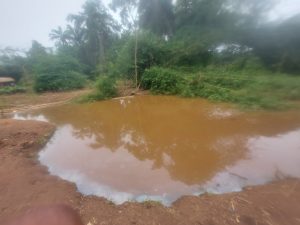
Residents of Ogere-Remo continue to suffer losses due to oil spillage occasioned by activities of vandals who burst pipelines belonging to the Nigerian National Petroleum Corporation (NNPC) that pass through the community. MISTURAH OLATUNJI reports on the plight of the farmers in the community.
For about 15 years, Ramota Sulayman used to be a full-time farmer. She gets a bountiful harvest of yam, cocoyam, maize and manioc on her large acres of land in Itajin village, a community in Ogere-Remo, Ikenne Local Government Area of Ogun State.
Two years ago, Ramota had to abandon the farmlands she inherited from her forebears following the incessant activities of vandals which made her incur inestimable losses.
“Crops no longer germinate on my land,” she said. “I no longer plant there. The oil spill didn’t allow them to germinate. Seedlings rot once the soil is polluted.”

Ramota now owns a food canteen where she makes between N18,000 and N20,000 monthly. With this meagre income, she is responsible for eight grandchildren left in her care by her children.
“When I harvest my manioc (cassava), I sell a truck for about N12,000 then; and I harvest about 20 trucks of the cassava (an estimated profit of N240,000),” she told this reporter.
The 60-year-old widow and others in the community are now at the mercy of vandals whose activities continue to impoverish the community. The main occupation of the residents of Ogere-Remo are food crops farming and fishing.
Meanwhile, vandals put them at risk when they attack Nigerian National Petroleum Corporation (NNPC) pipelines that pass through the community to link Mosimi depot in neighbouring Sagamu local government.
Vandalisation – A national tragedy
In 21 months covering January 2019 and September 2020, 535 pipeline points on the Mosimi-Ibadan axis were damaged according to NNPC’s monthly report released in 2020 which detailed about 1,161 damages on pipelines nationwide. Vandalisation recorded on the Mosimi axis was only second to the Port Harcourt axis which recorded the largest share of “pulverised points” – 538 – within this period.
According to the NNPC report which was analysed by Premium Times, the highest monthly damages recorded in any of the five axes including Gombe, Kaduna, Warri, River and Niger were recorded in 2019, with the highest being in January 2019 with 230 cases of vandalism.
The second-highest was in July of that year with 228 cases. This is trailed by the 186 theft cases in September 2019 and the 159 cases in August of the same year. In September 2020, when the last edition of the report was published, a total of 21 pipeline points were vandalised, a 43 percent decrease from the 37 points recorded in August 2020.
Prior to that, the country had recorded 2,181 vandalised pipeline points between October 2018 and October 2019.
Between 2020 and 2021, the NNPC spent N78bn on pipeline maintenance. N49.68 billion was budgeted in 2020 and N29.23 billion in 2021. While NNPC keeps budgeting billions for pipeline repairs and management, available data showed that the country has not successfully been able eradicate pipeline vandalism.
Gale of horrible experiences
Not only NNPC feels this heat and losses, but also farmers and residents who spoke with this reporter.
The oil spill in Ogere forced one of the leaders of the community who is also a large scale farmer, Olutunde Adesanya, to abandon his farm. Before the oil spill, the profit he made from farming was sufficient for his needs then. He lamented that he now survives on meagre earnings from his new small farm.

“The pipeline is not far from my farm. There is nothing I can plant that will germinate there; I only go there to cut wood to cook.
“I plant somewhere else now. My new farmland is not like the farm I cultivated before where I planted pineapple, and cassava among other food crops, but I no longer plant anything there,” the aged man said.
The misfortune that befell Samson Odeyemi, a chief and resident of the community as a result of oil spillage was disastrous.
Odeyemi and his family usually eat homegrown rice before oil spills polluted his farmland. “Nothing germinates on the farmland” where he plants kola nuts, manioc, and rice.
“We have been experiencing this for more than ten years now; the pipelines have been dug in this village for more than ten years.”
“When vandals destroy the pipeline, the oil seeps into the ground and destroys our plants,” Odeyemi explained in an emotional tone. “Petrol doesn’t do any good on the plants.”
For some years now, his profit has been cut to half since the harvest on the farm is very poor. But before now, “we harvest bitter kola and we get more than five baskets from a tree. When we process it, we know how much we gain from it. The products are exported to Hausa land and sold to the Fulanis and they bring our money home,” he said.
‘Fishes smell like petrol’

A fish farmer, Ayo Adewunmi decried that fish farming has become less lucrative as oil spillage kills aquatic animals.
“It is the oil that is killing the fishes,” he pointedly said.
Adewunmi added that the activities of the vandals also had a negative impact on the income generated by fish farmers, noting that “during the rainy season, we make between N20,000 or N50,000 monthly; but when the oil spills began, our profit really reduced.”
He pointed out that he now makes about N10,500 while calling on the government to find a lasting solution to the challenges of vandalisation and oil spillage.
He added that “Customers no longer patronise me again. I cannot blame them since what they bought smelled like petrol. They complained that after cooking, the fish still smells like petrol.
“It also destroyed the community river. We get our drinking water from that river before. The water used to be purified before but it has now been polluted.”

Security agencies’ efforts to curb vandalism
The vandals’ activities did not go unabated. While continuous efforts are being made to arrest their activities on the oil pipelines, the Nigeria Security and Civil Defence Corps (NSCDC), the agency in charge of the security of petroleum pipelines warned that vandals of oil installations and petroleum products thieves risk 21 years to life imprisonment if and when tried under the Miscellaneous Law.
Findings also revealed that the affected community also becomes a battlefield whenever pipeline vandals clash with the anti-vandal team of the NSCDC. The NSCDC pipeline patrol team along the NNPC Pipeline Right of Ways (PROWs) in Ogere impounded an unregistered Ford bus hidden in Igbo Olobo forest/bush with 106 kegs of petrol at about 4:37 pm on Wednesday, March 2, 2022.
Similarly, at a press briefing organised to announce the achievements of the agency in the first quarter of 2022, the Ogun State Commandant of NSCDC, Kolawole Taiwo, stated that there had been a reoccurrence of petroleum pipeline vandalism in the state.
“In the last three months, January till March 2022, the command has had recurring vandalism attempts. However, the attempts were foiled by men of the Ogun NSCDC anti-vandal squad.
“We recovered 134 kegs filled with Premium Motor Spirit (PMS), 8 sacks of PMS, 5 Sienna buses with empty jerry cans with the other intention of sabotaging the crude oil from alleged vandals,” the commandant noted.
Environmentalists warn against outbreak of infectious diseases
With the continued spillage of petroleum products into farmlands, environmental experts have argued that the affected community is prone to outbreaks of infectious diseases.
They urged suspected vandals to desist from damaging petroleum pipelines while calling on the government to improve the security of pipeline communities.
“How do we continue to frequently kill our source of livelihood?” Co-founder of International Climate Change Development Initiatives, Olumide Idowu rhetorically queried this reporter.
“It has affected water in a variety of ways. And that is how you can see it floating on the water. You’ll notice that when there is oil spillage on freshwater, the water will be beneath while the oil will be floating on top of the water. And it is causing a lot of problems,” he added.

In the same vein, the Director of Environment Health and Management at the Ogun State Ministry of Environment, Onaeko Oluwawemimo, said: “This oil sticks to everything, it stays for a very long period of time if there is no total clean up. Oil can linger in the environment for years if it is not well cleaned up and because of that, they penetrate into the underground water and contaminate it.
On the impending infectious diseases outbreak, he further added that “animals that move around eat the polluted vegetation, drink the water, and become infected. Human beings also, in the quest for hunting get those animals and eat them and in the process, the ecosystem becomes contaminated.
“All those chemicals that are embedded in those things are ingested by human beings and that is why you have a lot of illness and diseases emanating that you’ve not had a record of before.”
The report was sponsored by I-79 Media Consults under the ‘Rewriting the Narratives of Environmental Crimes in Nigeria’ project which is supported by the Environmental Reporting Collective (ERC).
